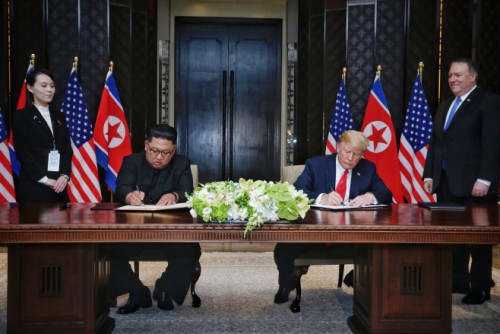 |
| U.S. President Donald Trump and North Korean leader Kim Jong-un sign a document at a ceremony marking the end of their summit at the Capella hotel on Singapore's Sentosa Island on Tuesday./ Source: Singapore Ministry of Communications and Information |
By AsiaToday reporters Choi Tae-beom & Heo Go-woon
US President Donald Trump and North Korean leader Kim Jong-un signed an agreement on Tuesday stating that Pyongyang would work toward complete denuclearization of the Korean Peninsula.
It is the first time in 70 years that the leaders of North Korea and the United States sat down at the table. It is noteworthy whether this "talks of the century" will not only end the hostile relations that have been going on between the two countries but also lead to a real path to peace on the Korean Peninsula.
The two leaders arrived at the Capella hotel on Singapore's Sentosa Island on Tuesday. They met on the steps of the hotel and shook hands on a red carpet. Things proceeded swiftly as planned after they moved to the conference room for their one-on-one meeting.
After the one-on-one meeting, the leaders engaged in several subsequent rounds of talks, including a luncheon. After a 1-minute outdoor stroll, they signed a document.
The joint agreement is consisted of four major points. The first point says, "The United States and the DPRK commit to establish new US-DPRK relations in accordance with the desire of the peoples of the two countries for peace and prosperity. (DPRK stands for the Democratic People's Republic of Korea.)"
The establishment of new US-DPRK relations suggests that the two sides will pursue diplomatic relations, economic cooperation, and seek to open an US embassy in Pyongyang. This can be interpreted as part of a plan to realize "security guarantee" that Pyongyang has been demanding.
In the second paragraph, the two countries stated that they will "join their efforts to build a lasting and stable peace regime on the Korean Peninsula." The third paragraph states that the DPRK commits to work toward the complete denuclearization of the Korean Peninsula, reaffirming the April 27, 2018, Panmunjom Declaration.
But the text of a joint agreement did not mention the "complete, verifiable, irreversible denuclearization", or CVID, that the United States has demanded. As there continues to be dissent about the specific methods of denuclearization, it seems the two sides will solve the issue with further negotiations.
In fact, the two leaders agreed to hold follow-up talks between U.S. Secretary of State Mike Pompeo and a senior North Korean official the earliest date possible.
But some argue that Trump made some concessions to North Korea to draw up "nuclear deal of the century." Pompeo has publicly stressed the importance of mentioning "CVID" in the agreement until the day before the summit.
Observers say the fact that U.S. and North Korean working-level officials held marathon talks on Monday proves that they had a sharp difference in viewpoint regarding the issue.
As the summit specified there will be further negotiations, the two sides are expected to work towards declaring a formal end to the Korean War and sign a peace treaty in accordance with Paragraph 2.
At a press conference after the signing ceremony, Trump raised hopes that the Korean War would end soon. "Now we can hope that it will soon end and it will, it will soon end," he said.
The fourth part of the agreement states that the United States and DPRK commit to recovering POW/MIA remains, including the immediate repatriation of those already identified. Remains of an estimated 5,300 missing American service members are in North Korea. Its repatriation is expected to recover the U.S.-North Korea relations while strengthening the bilateral cooperation in the future.
In the joint agreement, the two leaders said they were convinced that the establishment of new U.S.-DPRK relations will contribute to the peace and prosperity of the Korean Peninsula and of the world. Trump committed to provide security guarantees to the DPRK, and Kim reaffirmed his firm and unwavering commitment to complete denuclearization of the Korean Peninsula.
#Donald Trump #Kim Jong-un #agreement #complete denuclearization
Copyright by Asiatoday
Most Read
-
1
-
2
-
3
-
4
-
5
-
6
-
7





















